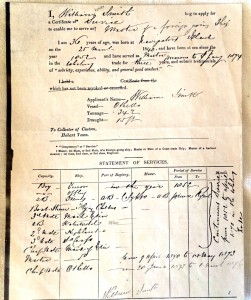
 Photo Credit: Leo Reynolds via Compfight
Photo Credit: Leo Reynolds via Compfight
As part of the discussions on the family history course, we have to work out six questions we will be asking at our interview. We also have to mention why we think these will be helpful to our research and what did we think of Thompson‘s suggestions.
Last night I read through the summary of the chapter by Thompson about interviewing and the types of questions that will get lots of information from your interviewee. It is similar to what we did in teaching; the how and why questions are better than just who, what, where and when. The last four will give facts but the why and how will give reasons.
So this is what I wrote in my discussion area:
I am going to hopefully interview a SMITH cousin who lives at Oyster Cove, Tasmania. His father is my grandmother’s youngest brother (I think).
So other than the basic when and where born etc, I want to add more information to the tree about social life and family life.
So here are my questions:
1. Where did you live as a child and who were your most common visitors?
2. Where did you go on holidays and was it with/to family?
Now questions about his father:
3. What do you know about your dad’s life as a child? Who did he live with and where?
4. Who were the people your dad often talked about? Were they relatives, friends or working buddies?
Now questions about his paternal grandparents:
5. Did your dad ever talk about his parents? What did he tell you about them?
6. What have you found out about your grandparents during your research? Where did you find out that information?
I know that Glenn and his wife are also researching the SMITH side of the tree so will be great to join our knowledge and add it to my blog here.
Now that I look at the questions, none are why or how at the beginning. But I think asking these questions will still gather more information to add to my tree and perhaps lead to more research areas in future.
The Thompson summary was great in that it asked questions in chunks – firstly the interviewee him/herself then progressing to parents and grandparents. Also dividing again into smaller chunks like early childhood, schooling, life at home, marriage, children.
To my readers: Are there any other questions you think I should be asking Glenn that could add to my family tree? Here is a link to what I know so far.
STOP PRESS UPDATE
I just did a google search about “Voice of the past: Oral History” and came up with an Oral History society in Australia with lots of resources.

